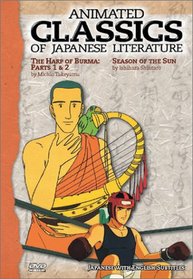| Genres: Anime & Manga, Animation Sub-Genres: Anime & Manga, Animation Studio: Central Park Media Format: DVD - Color - Animated,Subtitled DVD Release Date: 02/11/2003 Release Year: 2003 Run Time: 1hr 18min Screens: Color Number of Discs: 1 SwapaDVD Credits: 1 Total Copies: 0 Members Wishing: 0 MPAA Rating: Unrated Languages: English, Japanese Subtitles: English |
Search - Animated Classics of Japanese Literature: The Harp of Burma/Season of the Sun on DVD
  | Animated Classics of Japanese Literature The Harp of Burma/Season of the Sun Genres: Anime & Manga, Animation UR 2003 1hr 18min |
Larger Image |
Movie Details
We're sorry, our database doesn't have DVD description information for this item. Click here to check Amazon's database -- you can return to this page by closing the new browser tab/window if you want to obtain the DVD from SwapaDVD.
Click here to submit a DVD description for approval.
Similar Movies
Similarly Requested DVDs
|
Movie ReviewsThe war and its aftermath in two dramatic tales from Japanes Brian Camp | Bronx, NY | 10/02/2005 (4 out of 5 stars) "This entry in the "Animated Classics of Japanese Literature" series offers the two-part "The Harp of Burma," based on the novel by Michio Takeyama, and "Season of the Sun," from a story by Shintaro Ishihara. In keeping with Central Park Media's attempts to package these DVDs somewhat thematically, "Harp" is set right at the end of World War II, while "Seasons" takes place ten years later and deals with young Japanese who are far more privileged than the prisoners of war in "Harp." "Harp of Burma" is one of the most moving stories in the entire series. At 48 minutes, it condenses the short novel on which it's based (available in English), which was also made into a two-hour live-action film, Kon Ichikawa's THE BURMESE HARP (1956). Still, it maintains the structure of the novel and touches the main points of the story, which centers on a squad of Japanese soldiers in Burma who surrender to British and Indian troops when they learn the war is over. The focus is on the fate of one of their number, Mizushima, who is sent on a mission to talk some holdouts into surrendering, only to disappear for a long stretch and turn up as a Buddhist monk who visits his comrades but refuses to talk to them. When we finally learn the story behind his transformation, it offers a sad and heartbreaking illustration of the irrevocable effects of war on a man's psyche. The character design is quite simple, with Mizushima the only character differentiated in any significant way, although this tactic actually works quite well. One important element of the story is the music and its power to communicate. Mizushima plays a Burmese harp both as a soldier and as a monk, and the Japanese soldiers sing together quite frequently (including a Japanese version of "Home, Sweet Home"). In fact, it is their singing when surrounded by British and Indian troops early in the story that prompts the British and Indians to sing in response, thereby encouraging a peaceful surrender rather than a last-ditch firefight. "Season of the Sun" deals with a self-centered young boxer whose good looks and physique attract the romantic attention of a well-off single woman at a seaside resort during a summer vacation. Their dates include scenes of lovemaking and nudity that are quite surprising in a prestigious, literary TV series of this type. The affair starts to go sour when the cocky young man begins mistreating the woman, seemingly out of boredom. As it turns out, although these "modern" characters have considerably more freedom than the characters in earlier eras of Japanese history seen in other episodes of this series, they are ultimately no happier. The character design is stronger and more detailed than in any other episode of this series I've yet seen. The backgrounds are rendered in great detail as well. This volume is certainly on a par with the other superior DVD entries in this series, "The Sound of Waves/Growing Up" and "Izu Dancer/Dancing Girl/Ghost Story" (both of which are also reviewed on this site). Noburo Ishiguro, better known for directing parts of "Space Battleship Yamato" and "Macross" (Robotech), directed all three of the episodes on this disc. " Heart-rending, heart-warming story Charlotte Ann Hu | Arizona, USA | 02/27/2007 (5 out of 5 stars) "It's true the animation in this series is basic, but the Japanese is wonderfully slow with good pauses between sentences making this a great series for studying Japanese language. It is also a wonderful way to learn about Japanese culture and literature.
Most students know about WWII through the eyes of the victims of Pearl Harbor or through the stories of the Rape of Nanking, but there noble Japanese soldiers as well. Japanese friends say the Harp of Burma is based on a real person. A Japanese soldier who is injured and lost in a fight and sees hundreds of his brother's in arms lying on the battlefield. In the shinbutsu custom, proper burial is critical to the soul's peace and so he feels compelled to take care of his brethren. This story of dedication is heart-warming. Most students become familiar with classic works of western literature, such as Shakespeare, Hemingway and Hawthorne, but rarely do we get a glance inside the great works of literature in other cultures. This is powerful segment and the story transends the spartan animation. Well worth the time and money." |
















